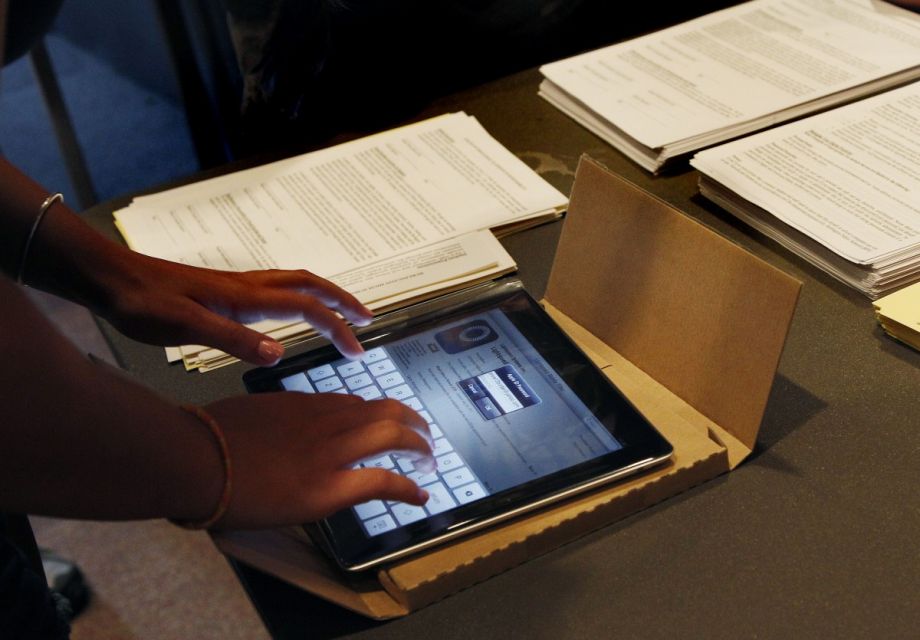The digital age offers countless learning platforms — from coding boot camps to teaching through gaming. But for those who advocate upending the traditional U.S. classroom, there’s an obvious shortcoming: No national network exists to connect students to out-of-school opportunities, both online and in their backyard. A new initiative seeks to remedy that — with the help of nonprofits and mayors in cities around the country.
The MacArthur Foundation and a large coalition of partners — including Starbucks, Electronic Arts, Arizona State University and John Legend — today announced LRNG, a project financed by $25 million in early capital from MacArthur that boldly claims to be “the evolution of learning.” It aims to track all forms of student achievement, wherever it happens, with digital badges. The goal isn’t just to instill a love of learning for learning’s sake. By leveraging corporate partnerships and the Internet, they intend to create an ecosystem that prepares kids for tangible career paths within their interest areas. (MacArthur also provides funding support to Next City.)
“The future of learning is a disparate, webbed set of opportunities for young people,” says Connie Yowell, a former MacArthur executive who is heading up LRNG. “Our job at LRNG is actually to connect this new webbed approach to learning so that all kids have access to it.”
Over the course of its first three years, the project has a goal of partnering with upwards of 70 cities — working with an anchor nonprofit in each case, along with the mayors’ offices and school districts — to create an online repository of programs in each place that students and parents could browse. Those city-based catalogs will be linked together by LRNG.org. That national site would track students’ out-of-school accomplishments with digital badges and be a place where students around the country could connect. There will be a “discovery feed” that functions sort of like an educational version of Spotify or iTunes, Yowell says, suggesting new content or learning opportunities based on a student’s demonstrated interests and where they live. Mentors and teachers will also be invited to join the ecosystem through LRNG Innovators, a subset of the platform. (The website went live today, but many of the features won’t be fully accessible for students until next spring at the earliest; today’s announcement is a “call to partners,” according to Yowell.)
For the last couple years, four cities have been piloting the concept on a local scale under the name Cities of Learning. Chicago was the first in 2013, followed by Dallas, Pittsburgh and Washington, D.C.
“The idea is for kids who go deep in one interest area and demonstrate a real understanding of it, the system will allow for them to connect in meaningful ways,” says Margaret Black, senior director of operations at Big Thought, the nonprofit in charge of the Dallas City of Learning in conjunction with the mayor’s office. The project targets low-income students — many of whom, in Dallas, enter sixth grade nearly 6,000 hours of learning behind middle- and high-income peers on average. So far, more than 34,000 kids have registered for the program (soon to be rebranded Dallas LRNG) since its inception in 2014, and 70 percent of them live in under-resourced zip codes, according to Black.
“We know that a lot of the access strategies we’ve been pushing really hard on the ground in Dallas are working and we have the right kids in the system,” says Black. Still, the advantage of having LRNG as a formative umbrella organization will be undeniable. “LRNG is a greater support system with access to national content that we can localize for our own needs.”
How does it work exactly? Well, take Dallas City of Learning’s recent partnership with the locally based global watchmaker Fossil. Black’s Big Thought might create a series of challenges — both online and offline — that involve the field of apparel design. Students would complete the challenges and earn badges. Upon demonstrating a certain level of proficiency, a student would be given the opportunity to shadow a designer at the headquarters of Fossil. “The idea eventually being that they might be able to have an internship,” says Black. “So it’s ripe for potential to connect the right kids to real-life working experiences.”
She described the city-level work as a project in three steps: one, creating an inventory of learning opportunities across the city for kids and families to explore; two, integrating badges into existing summer programs and enrichment opportunities so that students have something to show for their achievements and the programs have data to show for their service; three, using that data to identify “program deserts” as well as which kids in which neighborhoods may need to be targeted in terms of improving the opportunity gap.
Corporate involvement is obviously critical. “That’s part of why we’re launching Tuesday at the Chamber of Commerce Foundation [annual Corporate Citizenship] conference, so that we can bring on corporate partners and local companies,” says Yowell.
LRNG has already partnered with the 100,000 Opportunities Initiative, a group of 29 large corporations that pledged to create 100,000 pathways to employment for disconnected youth by 2018. That’s the same deadline for LRNG to reach its goal of having one million students registered on the website. (Yowell acknowledges that the digital divide may hinder students who don’t have Internet access at home, but hopes a mobile-friendly site will help some who can connect via smartphone.)
Meanwhile, LRNG’s badge system will be the largest-scale test to date of the efficacy of digital badges in measuring student achievement within the fragmented world of Internet-driven learning. The concept has gained endorsements from the likes of former president Bill Clinton and Mozilla, among others, and the new nonprofit running LRNG, Collective Shift, will in fact be absorbing a group called the Badge Alliance, which has been financed in part by the MacArthur Foundation. If employers buy in to the legitimacy of badges as a form of educational currency in the 21st century — measuring learning that happens outside the classroom, and thus can’t be measured in standardized tests or diplomas — then LRNG could be the de facto clearinghouse. And they could.
“We’re working with a whole set of employers with the hope that as young people earn a set of badges, they will open up the opportunity to job internships, interviews and potentially jobs,” says Yowell. Most of all though, she views badges as a means — not an end — to fostering interest-driven learning. “What we’ve learned from the 10 years of research I oversaw at MacArthur is first, the most robust learning happens when a young person is engaged in the thing they care most about.”
The Equity Factor is made possible with the support of the Surdna Foundation.

Malcolm was a Next City 2015 equitable cities fellow, and is a contributing writer for the Fuller Project for International Reporting, a nonprofit journalism outlet that reports on issues affecting women. He’s also a contributing writer to POLITICO magazine, Philadelphia magazine, WHYY and other publications. He reports primarily on criminal injustice, urban solution and politics from his home city of Philadelphia.

















